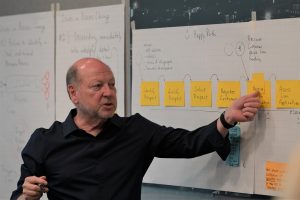Alec Sharp
Clariteq Systems Consulting
There is a worldwide resurgence of interest in Business Processes because all value delivered by an organisation – every product or service – is the result of an end-to-end, cross-functional, Business Process. This three-day, highly interactive workshop provides a proven, Agile methodology for Business Process Change, with an emphasis on practical, repeatable techniques and guidelines. It combines the core content from two popular workshops by Alec Sharp – Working With Business Processes and Advanced Business Process Techniques. This structure has been extremely well-received – it quickly gets everyone, whether new or experienced, to the same baseline on Clariteq’s unique, Agile, and ultra-practical approach to Business Process Change. On this platform of shared understanding and techniques, the entire group moves forward into advanced topics, well beyond what is covered in introductory courses.
First, the workshop demonstrates how to effectively communicate Business Process concepts, how to discover a business process, scope it, assess it and establish goals, and how to model it with progressive detail. Then, it shifts to advanced topics – specific, repeatable techniques to develop a process architecture, encourage support for change, and complete a feature-based process design.
The emphasis is always on ensuring Business Process initiatives are aligned with human, social, and political factors, organisational culture, and enterprise mission, strategy, goals, and objectives. Participants will be well-prepared for the challenges of successful Business Process Change. In fact, many organisations apply techniques learned in this workshop to all their organisational change initiatives. Real-life case studies are employed throughout – some participants say the examples of how the techniques are applied in practice is the best part of the workshop.

Business professionals with responsibility for improving their processes and business analysts needing solid techniques will both benefit from this workshop. Specifically, anyone involved in Business Analysis, Business Change, Business Architecture, and Business Process Management (BPM) especially BPM professionals, Process Analysts and Designers, Business and Process Architects, Business Analysts, and Project / Programme Managers. Also, Business Managers and Subject Matter Experts responsible for effecting process change, Organisation Development professionals needing to learn more about business processes, and anyone involved in process-driven solution development.
Practical techniques and clear guidelines will be provided in these areas:
At the top of this page you can download the PDF brochure of this workshop.

Van der Valk Hotel Utrecht
Winthontlaan 4-6
3526 KV Utrecht
Telefoon 030 8000 800
The hotel is very well accessible by public transport. From busstop ‘Kanaleneiland Zuid’ it is only a three-minute walk. You can take buses 63, 65, 66, 74 and 77 from Utrecht Central Station and you also take the tram line 20 or 21 from the train station and get off at stop ‘Kanaleneiland’. Please consult www.9292.nl (door-to-door journey planner, also available in English) or call 0900-9292 (travel advice by phone, € 0.70 p/m).
Van der Valk Hotel Utrecht is also located next to the highway A12, exit 17 (Utrecht / Jaarbeurs / Kanaleneiland).
Although the hotel has a large parking garage, we cannot guarantee parking spots. We therefore advise you to go by public transport.
For those who would like to arrive the day before, there is the possibility of staying at the Van der Valk Hotel Utrecht. However, the hotel does not provide special discounts for attendees of events. Therefore, when interested in an overnight stay, please consult Van der Valk directly to make a reservation.
More information about the hotel and the location can be found on their website www.vandervalkhotelutrecht.nl.
“Amazing hands-on course. Alec is never short of an example, which is very helpful.”
“Awesome masterclass to also master facilitating skills.”
Practically all of our seminars and workshops can be offered as an In-house course for your company exclusively. We can tailor with extra focus on specific topics that apply to your organization. Also available in online format or in face-to-face format with live video stream.
From Concept to Implementation Take the step towards autonomous intelligence in your organization, and discover how AI Agents improve processes, streamline decisions, and increase productivity. Practical hands-on workshop by Thomas Gijsels. During the workshop, you will build various AI Agents in a low-code tool.
April 21, 2026
Utrecht
Balancing Engagement, Agility, and Complexity This data modelling workshop by Alec Sharp covers Entity-Relationship modelling from a non-technical perspective, provides tips and guidelines for the analyst, and explores contextual, conceptual, and detailed modelling techniques that maximize user involvement.
June 1-3, 2026
Utrecht
Fundamentals and Best Practices Workshop hosted by Christian Gijsels on analyzing, modelling and simulation with the latest release of Sparx Enterprise Architect, version 16. Archimate, BPMN modelling, DFD, DMN, UML, including data modelling features.
Only available as In-house
At your office
Making Data Modelling a Vital Technique This workshop by Alec Sharp introduces concept modelling from a non-technical perspective, provides tips and guidelines for the analyst, and explores entity-relationship modelling at conceptual and logical levels using techniques that maximise client engagement and understanding.
March 25, 2026 (half day)
Utrecht
ChatGPT / CoPilot / Gemini for End-to-End Business Analyis Artificial Intelligence, undoubtedly one of the most ground-breaking technologies to date, is opening new doors for analysts with innovative tools and capabilities. OpenAI's ChatGPT, for example, can be applied in strategic, business and functional analysis in various ways. Hands-on workshop.
May 20, 2026
Utrecht
Empower Your Data Modeling and Analytics with AI-Driven Contextual Intelligence This workshop provides you with an in-depth understanding of the powerful synergy between knowledge graphs and LLMs to improve the way data is modeled, analyzed, and utilized. Participants combine theory with practical experience through hands-on exercises.
Only available as In-house
At your office
The leading Dutch website on corporate software engineering Release keeps its readers up-to-date on the latest developments in software engineering. We always keep an eye on new developments in architecture and organizational aspects. Furthermore Release offers a wealth of content including whitepapers, blogs by thought leaders, interviews, videos and such.
Business Intelligence, Data Warehousing, Big Data and Data Management Independent portal on Business Intelligence, Data Science & Analytics, Data Warehousing, Data Management and Big Data in The Netherlands. BI-Platform offers a wealth of content, such as blogs, interviews, videos, whitepapers and more.
